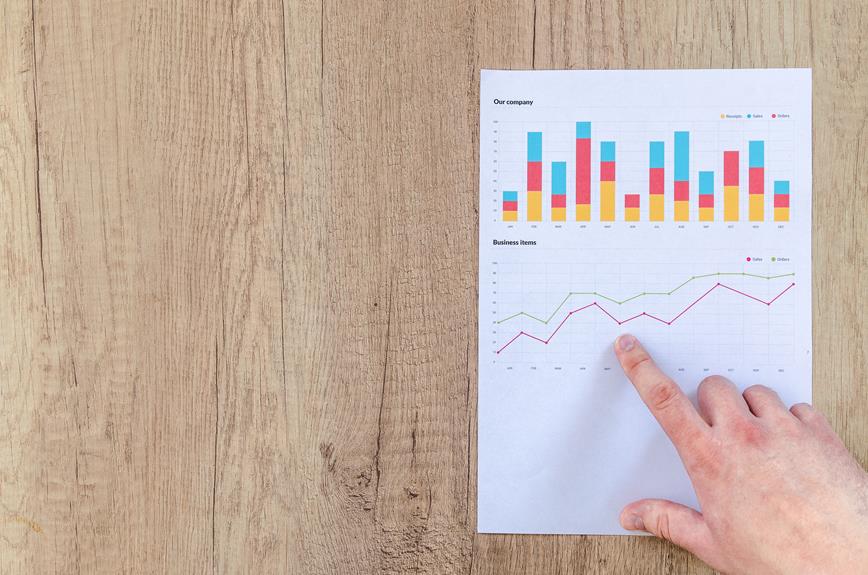Are you looking to seamlessly integrate data analysis tools with Google Sheets? Look no further!
In this article, we will explore the top data analysis tools that seamlessly integrate with Google Sheets.
Discover how Google Analytics, Data Studio, Bigquery, Tableau, and Power BI can enhance your data analysis capabilities within the familiar and user-friendly interface of Google Sheets.
Get ready to unlock the full potential of your data with these powerful integrations.
Key Takeaways
- Google Analytics provides detailed insights into website traffic, user behavior, and conversion rates.
- Data Studio is a powerful tool for data visualization and reporting.
- Bigquery is a powerful data warehouse and analytics solution provided by Google Cloud.
- Tableau and Power BI offer advanced visualization and data exploration features.
Google Analytics Integration With Google Sheets
You can integrate Google Analytics with Google Sheets to streamline your data analysis process.
There are several advantages of using Google Analytics for data analysis. Firstly, Google Analytics provides detailed insights into website traffic, user behavior, and conversion rates, allowing you to make data-driven decisions. Secondly, it offers robust reporting and visualization capabilities, making it easier to interpret and share data with stakeholders.
To effectively integrate Google Analytics with Google Sheets, consider the following tips.
First, use the Google Analytics add-on for Sheets to directly import data from your Google Analytics account.
Second, use filters and segments in Google Analytics to focus on specific data sets before exporting to Google Sheets.
Lastly, automate data updates by scheduling regular data imports from Google Analytics to Google Sheets.
Data Studio Integration With Google Sheets
One popular data analysis tool that integrates with Google Sheets is Data Studio. Data Studio is a powerful tool for data visualization and reporting that allows you to create interactive and visually appealing dashboards. With its seamless integration with Google Sheets, you can easily import data from your spreadsheets and use it to build beautiful and informative reports.
| Feature | Description |
|---|---|
| Drag-and-drop | Data Studio provides a user-friendly interface where you can easily drag and drop data fields to create visualizations. |
| Customizable | You can customize the appearance of your reports by choosing from a variety of chart types, colors, and fonts. |
| Real-time data | Data Studio allows you to create reports that automatically update with real-time data, ensuring that you always have the most up-to-date information. |
Bigquery Integration With Google Sheets
To continue the discussion on integrating data analysis tools with Google Sheets, let's explore the Bigquery integration.
Bigquery is a powerful data warehouse and analytics solution provided by Google Cloud. By integrating Bigquery with Google Sheets, you can leverage the benefits of Bigquery's scalability, speed, and advanced analytics capabilities directly within your spreadsheet.
One of the key benefits of Bigquery integration is the ability to analyze large datasets quickly and efficiently. Bigquery is designed to handle massive amounts of data, making it ideal for organizations with large and complex datasets. Additionally, Bigquery's advanced analytics features, such as machine learning and data visualization, can be utilized in Google Sheets to gain deeper insights from your data.
There are various use cases for Bigquery integration with Google Sheets. For example, you can pull data from Bigquery into Google Sheets to perform ad-hoc analysis, create custom reports, or build interactive dashboards. You can also use Bigquery's SQL capabilities to query and manipulate data directly within Google Sheets, eliminating the need for complex data transformations.
Tableau Integration With Google Sheets
Continuing from the previous subtopic, the integration of Tableau with Google Sheets enhances your data analysis capabilities.
When it comes to data analysis, Tableau is a powerful tool that offers advanced visualization and data exploration features. It allows you to connect directly to your Google Sheets data and create interactive dashboards and reports.
Compared to Power BI, Tableau provides more flexibility and customization options, making it a preferred choice for complex data analysis tasks.
By integrating Tableau with Google Sheets, you can leverage the benefits of both platforms. Google Sheets offers a collaborative and cloud-based environment for data storage and manipulation, while Tableau provides powerful data visualization and analysis capabilities.
This integration allows you to analyze and visualize your Google Sheets data in a more efficient and meaningful way, enabling you to make data-driven decisions with ease.
Power BI Integration With Google Sheets
To integrate Power BI with Google Sheets, you can access a wide range of data analysis functionalities and visualization tools. Power BI is a powerful business intelligence platform that offers several advantages over Tableau. With Power BI, you can easily connect to your Google Sheets data and create interactive dashboards and reports. The integration allows you to leverage Power BI's advanced analytics capabilities, such as data modeling, data cleansing, and data transformation. Additionally, Power BI offers a wide range of visualization options, including charts, graphs, and maps, to help you present your data in a clear and compelling way. Overall, Power BI provides a seamless and efficient integration with Google Sheets, making it a valuable tool for data analysis and visualization.
| Advantages of Power BI | ||
|---|---|---|
| 1. Advanced analytics capabilities | 2. Wide range of visualization options | 3. Seamless integration with Google Sheets |
Conclusion
Overall, there are several powerful data analysis tools that seamlessly integrate with Google Sheets.
Google Analytics provides deep insights into website performance, while Data Studio allows users to create visually appealing reports.
Bigquery enables the analysis of large datasets with lightning-fast speed, and Tableau and Power BI offer advanced data visualization capabilities.
By leveraging these integrations, users can enhance their data analysis workflows and make informed decisions based on the accurate and detailed information provided.

